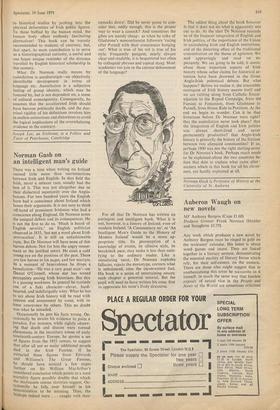Norman Gash on an intelligent man's guide
There was a time when writing on Ireland seemed little more than recriminations between Irish and English. In that field the Irish, never a reticent race, usually had the best of it, This was not altogether due to their dialectical superiority over the Anglo- Saxons. For two hundred years the English have had a conscience about Ireland which lames their arguments. It is not easy to think off-hand of prominent Irishmen who had a conscience abou; England. Dr Norman notes the unequal debate and its consequences. He is not the first to do so. 'Much is heard of English severity,' an English politician observed in 1833, 'but not a word about Irish Provocation'. It is still an unfashionable topic. But Dr Norman will have none of this barren debate. Not for him the angry resent- ment or the justified retort. He casts a cold Young eye on the passions of the past. There are few heroes in his pages, and few martyrs. In a moment of benevolence he drops a benediction—'He was a very great man'—on Daniel O'Connell, whose star has waned perceptibly among Irish historians, But this Is a passing weakness. In general he reminds one of a Saki character—clever, hard- hearted, and indefatigably witty. What he has to say about Irish history will be read with interest and amusement by some, with in- tense annoyance by others. This no doubt was what he intended.
Occasionally he gets his facts wrong. Oc- casionally he strains his evidence to point a paradox. For instance, while rightly observ- ing that death and disease were normal phenomena in the insanitary towns of early nineteenth-century Europe, he quotes a set of figures from the 1851 census, to suggest that after all not so many additional people died in the Irish Famine. If he extracted these figures from Edwards and -Williams's The Great Famine, he should have noticed a few pages further on Sir William MacArthur's Considered conclusion which points to a total mortality figure possibly double that which the inadequate census statistics suggest. Oc- casionally he falls over himself in his determination to be amusing. Thus, the bishops indeed were . . . taught with their
cassocks down'. Did he never pause to con- sider that, oddly enough, this is the proper way to wear a cassock? And sometimes the gibes are merely cheap: as when he talks of Gladstone's nonconformist followers 'racing after Parnell with their consciences hanging out'. What is true of his wit is true of his style. Frequently pungent, nearly always clear and readable, it is bespattered too often by colloquial phrases and topical slang. Must academics too join in the current debasement of the language?
For all that Dr Norman has written an astringent and intelligent bqok. What it is not, however, is a history of Ireland, even of modern Ireland. 5A Commentary on', or 'An Intelligent Man's Guide to the History of Modern Ireland' would be a more ap- propriate title. Its presumption of a knowledge of events, its allusive style, its breakneck pace, may make it less than satis- fying to the ordinary reader. Like a stimulating tutor, Dr Norman explodes fallacies, rejects the stereotype, corrects what is unbalanced, cites the inconvenient fact. His book is a series of entertaining essays; each chapter a potential tutorial. But the pupil will need to have written his essay first to appreciate his tutor's lively discourse.
The oddest thing about the book however is that it does not do what it apparently sets out to do. At the start Dr Norman reminds us of the frequent integration of English and Irish politics, of the importance of the Union in assimilating Irish and English institutions, and of the distorting effect of the traditional concentration on the theme of agitation. We nod approvingly and read on ex- pectantly. We are going to be told, it seems, about those important aspects of Irish history whose sober claims for historical at- tention have been drowned in the Great Anglo-Irish polemical debate. But what happens? Before we realise it, the irresistible contagion of Irish history asserts itself and we are rattling along from Catholic Eman- cipation to the Repeal Campaign, from the Famine to Fenianism, from Gladstone to Parnell, from Home Rule to Partition. At the end we begin to wonder. Can it be that historians before Dr Norman were right? that the assimilation never took place/ that the integration of English and Irish politics was always short-lived and never permanently productive? that Anglo-Irish history is primarily the history of the friction between two alienated communities? If so, perhaps 1800 was not the right starting-point for Dr Norman's book. Perhaps much needs to be explained -about the two countries be- fore that date to explain what came after : matters which in this book for all his clever- ness, are hardly explained at all.
Norman Gash is Professor of History at the University of St Andrews


































 Previous page
Previous page